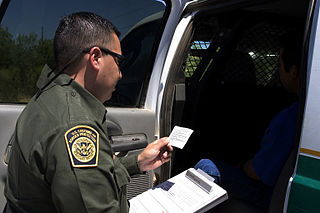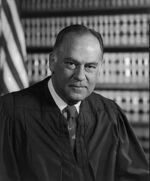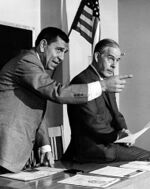Miranda warning
The Miranda warning is what the police in the United States tell someone who is accused of a crime, just before things get down to the nitty-gritty. Miranda is a settled aspect of American law that the Supreme Court trots out from time to time when it can devise no other way to free a murderer.
The basis for the Miranda warning is not just a bodily orifice of a Supreme Court Justice, but the Fifth Amendment to the U.S. Constitution that guarantees that no one must be "a witness against himself"; also the Sixth, which elevates "the assistance of counsel" to a human right, long before society added the assistance of doctors, career guidance counselors, and short-order cooks.
American police now talk about whether a suspect has been "Mirandized," a concept that has nothing to do with iCarly.
History
In 1963, Miranda, a Latin American pitcher in Minor League Baseball who tended to respond to any criticism by saying, "Choo din' tell me dot was bod!" was accused and convicted of armed robbery, kidnapping, and rape of a mentally handicapped young woman. When Miranda was arrested, he did not realize how an accused has rights in the United States. Seeing only the handcuffs and the panoply of police service weapons pointed at him, he spilled his guts even before the weapons could do it for him, confessing to the crimes and explaining how the robbery unfolded so as to require the rape of the young woman.
In 1966, in the case Miranda v. Arizona, the Supreme Court ruled in Miranda's favor, Chief Justice Earl Warren writing for a 5-4 majority that "Miranda is guilty as sin. But we are going to let him go." Miranda had signed a printed form that he had been advised of his rights and that the confession was voluntary. But crucially, police never told him that he also had the right to a lawyer on the taxpayers' dime, who might have come up with additional stalls and evasions that would free Miranda to rob and rape again.
In fact, Arizona State Troopers arrested Miranda again. This time, prosecutors informed him of all his rights, exactly as the Court had specified. They were also careful not to rely on the confession that Miranda had made before he knew all of his rights. Instead, they took a wild guess that Miranda had committed armed robbery, kidnapping, and rape of a mentally handicapped young woman. They also gave Miranda his free government lawyer. However, like free government Nutrition Facts and free government health care at the Veterans Administration, this turned out to be as useful as tits on a bull. Miranda was found guilty and hauled off to the slammer.
Form of the warning
Importantly, the Supreme Court did not say what words the police had to use when informing the accused of his rights. In addition, they do not have to be read in any particular order. Justice Potter Stewart wrote in a concurring opinion, "I cannot define the Miranda warning — but I know it when I hear it." Not that an Associate Justice of the U.S. Supreme Court hears it very often.
The Miranda warning, as it is most often paraphrased so as not to make Cops-and-Robbers television shows as boring as real life is, is as follows:
| “ | You have the right to remain silent. Anything you say can and will be used against you in a court of law. You have the right to consult an attorney. If you cannot afford an attorney, one will be appointed for you. | ” |
The courts have since ruled that, for the warning to be "meaningful," police must ask the accused whether he understands what the police have just read to him. The most common response, No hablo inglés, is readily accepted, as it is Spanish for, "Let's get started."
Viewers of Dragnet understand a gaping hole in the second sentence of the Miranda warning: The suspect can be freed if he says something that they do not use in a court of law. This is Hollywood's foremost get-out-of-jail-free card.
Exceptions
The Miranda rule is not absolute. Oddly, given enough trials conducted with free government lawyers, nothing in American law is absolute. Thus, just after declaring the Miranda rights, the courts set about to rein them in so that business-as-usual could continue to occur, especially in places where judges are elected and the Patrolmen's Benevolent Union has a large war chest.
The biggest exception is in cases of great danger to public safety. In New York v. Quarles (1984), the Court decided that an armed robber whose holster is empty does not need a lawyer to advise him whether or not to tell the police where he put the gun.
The Court has created other exceptions for "kaleidoscopic situations," for cases "where spontaneity rather than adherence to a police manual is necessarily the order of the day," and for "days when I got out on the wrong side of bed."
The Court has ruled that you cannot claim your right to remain silent after you have already sung like a canary. This applied to Obama's IRS Commissioner when she "took the fifth" in Congress, about using the tax agency to harass Obama's enemies, after finishing a sanctimonious speech. This ran afoul of another Court precedent: that it is silly to demand a lawyer be present when you are in a Congressional hearing room that is infested with them.
Modifications

Police in four states have modified the Miranda warning to say: "We have no way of giving you a lawyer, but one will be appointed for you when you go to jail." Suspects have interpreted this as meaning the confession must precede the free lawyer, but the Supreme Court has declined to specify the sequence. On the step in the sequence at which the accused pays for the free lawyer: That would be just after the jury announces its Guilty verdict.
In states on the Mexican border, suspects are given an additional Miranda right to "♪♪ three steps, three steps toward the door. ♪♪" This ensures that they have a sporting chance to get back into the State of Chihuahua, just as game animals have the right not to have hunters shoot at them from inside a vehicle despite the understandable desire to be closer to the beer cooler.
Military versions
In the Uniform Code of Military Justice, Article 31 guarantees the right against self-incrimination. It being the U.S. Army, the accused cannot simply waive his rights, but must sign Army Form 3881 in quadruplicate. It is a common practice to insert, between the pink and goldenrod copies, a requisition for laundry soap for the accused to sign at the same time, in case that is in short supply at Military Police headquarters.
Starfleet has no Miranda warnings. Adult delinquents such as Harcourt Fenton Mudd are never read technical definitions off a crib-card before Captain Kirk imposes innovative but extra-legal penalties. None of the most overused 100 Star Trek episode plots depend on whether aliens were read their human rights, nor on whether humans were read their tribble rights. However, several turned on the Prime Directive, a comparable and thoroughly impracticable statement of pan-species niceness. (Spoiled Wesley "Crumb" Crusher got sentenced to death for trampling an off-world flower bed, and the Captain got pissy, but this plot did not go on to become overused, for one obvious reason involving believability.)
Recent events
In 2007, UnNews reported that the Supreme Court had added new Miranda rights to protect the accused.
See also
| Featured version: 24 March 2016 | |
| This article has been featured on the main page. — You can vote for or nominate your favourite articles at Uncyclopedia:VFH. | |




